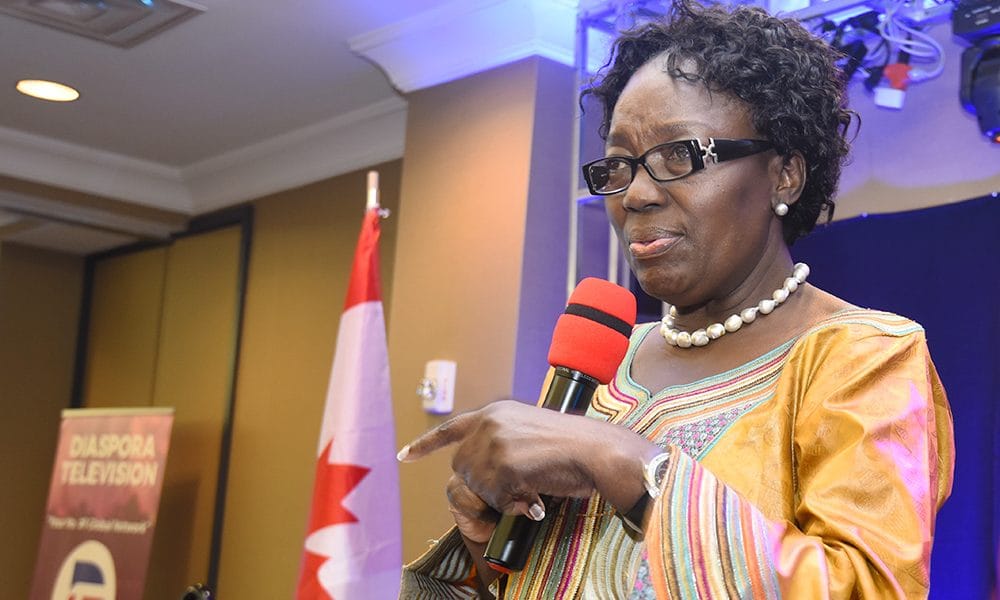
By. Our reporter
The Speaker of Parliament, Rebecca Kadaga, has criticised the international community for failing to make good on their financial contribution to support refugees in Uganda as they had pledged during the Kampala Solidarity Summit on Refugees between 21st and 22nd June 2017.
Addressing the 10th Conference of Speakers of African Parliaments and Senates at the Pan-African Parliament in Midrand, South Africa on Tuesday, 6 August 2019, Kadaga said that of the US$15million that was projected to be collected at the summit, only US$540,000 was realised.
“We had a solidarity summit in Uganda with all the world’s big names and leaders from the biggest economies but it was quite shocking when such leaders pledged very little sums of money and later even failed to fulfil these pledges,” she said.
Uganda, being second biggest refugee hosting country in the world and the first in Africa, was selected to host the refugee summit attended by world leaders and technocrats, including the United Nations Secretary General, Mr Antonio Guterres.
The United Nations High Commissioner for Refugees (UNHCR) June 2018 report shows that Africa has the highest number of forced migrants in the world. The continent accounted for nearly one third of the world’s 68 million forced migrants, including 6.3 million refugees and 14.5 million internally displaced persons.
Host countries continue to shoulder the responsibility of and facilitating the refugees access to basic needs. However, this dwindles the resources and diminishes the resilience of the hosts.
“Settling of refugees comes with a cost to our people because there is a lot of pressure on the local population to share facilities. In one of our districts of Adjumani, 50 per cent of the population is made up of refugees and so there is pressure on water, schools, health facilities and the environment and this is very costly to the Uganda government,” Kadaga said.
The Speaker of the Algerian Parliament, Slimane Chenine, said the increased armed conflict on the continent had worsened the sentient subject of refugees over the last two years.
“To resolve this problem, my country has always proposed a holistic approach that is balanced and will require solidarity based on human rights, sovereignty and national security,” said Chenine.
In his presentation, George Kachio, the UNHCR Representative for Southern Africa revealed that over 100,000 Africans leave the continent every year for Europe.
Speaker Kadaga requested the UNHCR to build permanent structures to accommodate health centres and schools in the refugee settlements as a stop gap to support host communities that have genuinely co-existed with refugees in the event that they leave.
Speaking as chief guest, the President of the Inter Parliamentary Union (IPU), Gabriela Cuevas Barron, called on countries of the AU work together in regard to development, gender equality, youth empowerment, fighting terrorism, climate change, migration and refugees issues.
“The safest countries in the world are those practising democracy. We have the power to change the world and we need to give results to our people,” Barron said and signalled out Kadaga for aggressively advocating for an IPU President that could work with Africa.
Kadaga proposed that for refugee host countries, there should be inter-ministerial coordination mechanisms to bring together the government, international, local and civil society organisations to address the refugee issue from a wider perspective.
“I want to confirm that refugees living in Uganda are not in the camps but settlements which gives them freedom of movement, access to social service and employment,” Kadaga told the Speakers.
The two-day Speaker’s conference was held under the theme, “Finding a durable solutions to forced migration to accelerate integration and development in Africa: the role of National and Regional Parliaments.
Over 90 per cent of African countries are party to the 1951 Refugee Convention and have passed laws for its implementation.
END




